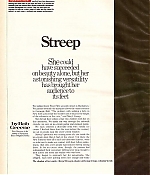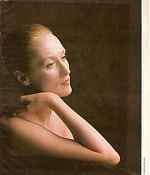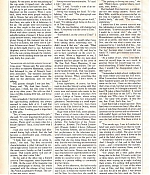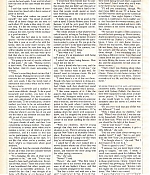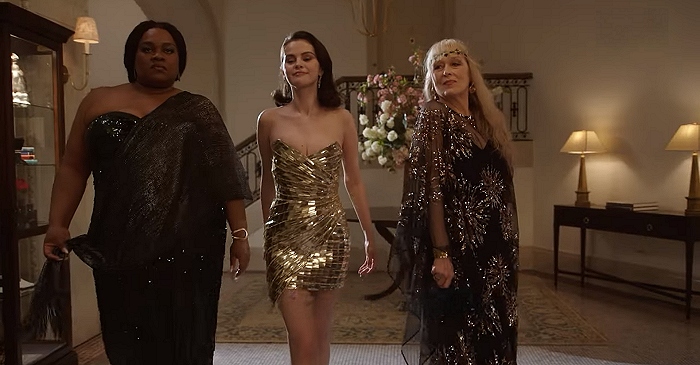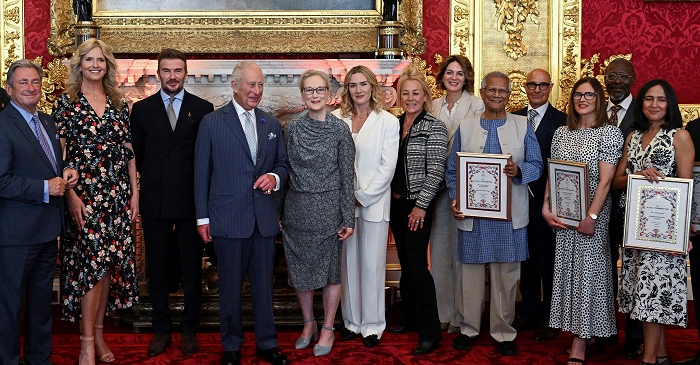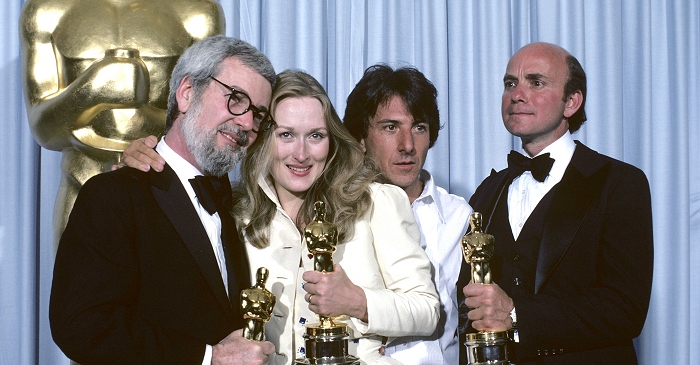|
Simply Streep is your premiere online resource on Meryl Streep's work on film, television and in the theatre - a career that has won her acclaim to be one of the world's greatest living actresses. Created in 1999, Simply Streep has built an extensive collection over the past 25 years to discover Miss Streep's body of work through thousands of photographs, articles and video clips. Enjoy your stay and check back soon.
|
|
Streep
Esquire ·
December 1984
· Written by Bob Greene
| ||
We walked down West Fifty-seventh street in Manhattan. We passed beneath the marquee above the main entrance to Carnegie Hall. “The problem with walking a baby in New York City is that the strollers are at exactly the height of the exhausts on the cars,” said Meryl Streep. She did not have either of her two children with her on this afternoon. We made our way through the sidewalk crowds; we saw an ice-cream parlor and stepped inside. We each ordered a chocolate soda with vanilla ice cream. I fetched them from the man behind the counter; we sat on stools near the store’s front window.
Streep’s presence was causing more of a stir inside the ice-cream shop than it had on the street. Out there the New Yorkers were all in such self-absorbed hurries, were so reluctant to make eye contact with their fellow pedestrians, that only a few people had noticed Streep among them. In the ice-cream store, though, the patrons had relinquished their customary defenses for long enough to look across the room and realize who was here. They began to approach her for autographs. She obliged, each time putting down her orange-and-white paper cup so that she could sign another napkin. At one point, as she was picking up the cup again, it tipped over, she spilled part of the soda on her bare left arm. I got up to get some napkins from the dispenser on the counter. When I came back, there were more people waiting to talk to Streep, her arm still wet. As they spoke to her and stared at her, it struck me that there was quite a bit of deference in the air. The people were not reacting to her as they might to this year’s most famous athlete, or most notorious rock star. Mixed with curiosity was an almost palpable feeling of respect; if these people could bestow honors, what they would be giving Streep at this moment was not an Oscar or an Emmy, but some sort of Lifetime Achievement Award. They reacted to her as they might react to, say, Katharine Hepburn; and as I looked at Streep’s face, lit by the sun coming through the window, I found it worth thinking about that she was only thirty-five years old.
“My mother and father always thought I was great,” Streep said. We were sitting in an office in midtown Manhattan, a place that belonged to one of Streep’s business associates. The business associate had said that Streep could borrow the office for the afternoon; now we were talking. “My parents thought I was just fine,” Streep said. “My Aunt Jane, though… Aunt Jane, I think, has only come to like me in my older years. She tells me that I was a terrible-looking little kid, and bossy besides.” Streep laughed. I had read references to her ugly-ducking childhood; she always seemed to make light of it. I said that surely it couldn’t have been very funny to her back then. Looking good is important to little girls. “Yes, it’s very important for little girls,” she said. “It’s very important for grown-up women, too, especially if they’re in the movies. There aren’t so many roles for a female Spencer Tracy, if you know what I mean.” I had also read that Streep had blossomed during high school; that she had become a cheerleader and, eventually, homecoming queen. “I think that came from an acting instinct,” she said. “My first successful characterization is what I devised for myself in high school. I laid out my clothes for the week every Sunday so that I wouldn’t repeat. That sounds pretty sick and obsessive, but that’s what I did.” On the wall of the office was a framed cover of Time Magazine, dated September 7, 1981. On the cover of the magazine was a color photograph of Streep; the article coincided with the release of her movie “The French Lieutenant’s Woman”. The cover line was “Magic Meryl”. I looked over at the cover. “That’s really an American icon,” I said. Streep seemed uncomfortable. “It’s just a role,” she said. “No,” I said, “it really is sort of an important part of America.” Streep was shaking her head. “It’s the lighting,” she said. “The photograph was very well lit.” “I’m not talking about the picture itself,” I said. “I’m talking about being on the cover of Time Magazine”. Now she was blushing, still shaking her head. “Everybody’s on the cover of Time,” she said. “Everybody’s on the cover of Time?” I said. It was clear that she would rather have been talking about something else. “I didn’t mean it that way,” she said. “What I meant is that they have fifty-two covers a year that they have to fill, and they’re got to have somebody on the cover every week. When it happened to me, I didn’t feel anything. But my next-door neighbor had her picture on the cover of The New York Times Magazine. It was an article about working women. The cover showed her kissing her child goodbye as she headed for work. That was impressive to me. It made me feel that I knew someone famous. When something like that happens to me… I don’t know, it has no impact.”
Every superlative, of course, has been used to describe Streep’s acting skill. Her thumbnail biography is known to virtually every man and woman who wants to become an actor. Born in suburban New Jersey. College at Vassar, where acting coaches began to notice her remarkable giftedness. Membership in a small repertory company in Vermont, then three years at the Yale School of Drama, where the praise for her work grew. Stage in New York; more plaudits. Then a string of movie roles that transformed her into the most admired actress of her generation: “The Deer Hunter”, “Manhattan”, “The Seduction of Joe Tynan”, “Kramer vs. Kramer”, “The French Lieutenant’s Woman”, “Sophie’s Choice”, “Silkwood”. Two Academy Awards, and an Emmy for her performance in the television mini-series “Holocaust”. And with every acting assignment, a recognition on the part of the public that she was doing things the hard way; that she was choosing unconventional parts, parts that were not guaranteed to automatically please everyone who had seen her last movie. Streep was developing a reputation for unpredictability in what she was willing to try; it was unpredictability in a positive sense – the unpredictability of a person willing to continually test her limits. Now, on this afternoon, she had recently completed filming a new movie called “Falling in Love”, in which she starred with Robert De Niro. In a few days she would be leaving for London, where another movie project was waiting. “The package is driving me crazy,” she said. “Winter shoes, summer shoes, medicine, toys, books…” Her husband, Don Gummer, a sculptor, and her two young children, Henry and Mary Willa, would be accompanying her on the trip to England. “I feel like Coach Landry lately,” she said. “The unsmiling statistacian.” I asked her if her current success was the culmination of some long-hidden childhood dream. “It never occured to me that I might be a movie star,” she said. “I looked at television, and there were the Mousketeers getting bosoms, and they were all so pretty. And there was Sandra Dee, and she was what a movie star was supposed to be. I watched all of this… but I never wanted to be inside the box. I saw ‘the box’ because what I mainly did was watch TV. I didn’t go to the movies very much. Still don’t. As a matter of fact, when I was little, I never let myself hope for very much, in general. Never lezt myself hope for very much anything. If I didn’t hope for very much, then I wouldn’t be disappointed when I didn’t get anything. I remember in high school, walking into the room where you took the SAT tests. What I remember thinking is that you got three hundred points just for writing your name on the test. I have no idea whether that’s true or not, but that was the rumor at our high school. So I thought to myself, ‘At least I’ll make three hundred.’ It turned out that I did okay on the SATs. But my attitude was ‘Who cared. It doesn’t matter.’ The same with people. ‘If they like me, fine, If not, that’s fine, too.”
I said that I had a stupid questions: How hard was it to memorize lines? After all the years of watching thousands of actors and actresses in the movies and on television, I still couldn’t figure out how they managed to memorize all of those words that someone else had written. Was there a trick to it? “Two weeks ago, I was in London for a brief visit, and it turned out that my mother was in London, too,” Streep said. “She was staying as a sublet. She gave me her phone number, and I wrote it down on the pad at the hotel where I was staying. Yesterday I wanted to call my mother. And I though of that pad in that hotel room… and I remembered the number. It’s a sort of idiot’s memory I have, and it’s what got me through college. I’ve always felt a little guilty about being able to do that. I’d read a script two or three times and I’d have my lines. The others were staying up at night studying their scripts. It’s nothing I felt particularly good about, though. It’s sort of like when I was at Yale, and they would post the cast lists of all the plays. I was always worried when the lists went up. Not because I was afraid I wasn’t doing to be on them. I was worried that I was going to be cast in the lead again. I was worried about how the rest of the class would feel about that”. I said that surely those kinds of emotions must be mixed with a fierce sense of pride in herself. “You know what makes me proud of myself?” she said. “I’m proud of myself when all of these things are set next to each other. If I make a false step, it’s only one step. It’s like the string of beads in a necklace. One stone may not be as interesting as the next, but the whole necklace is a good necklace.” She said that her plan is to work in spurts – do two or three movies at a time, then take a year or so off to be with her family, then do some more movies. She said she can never be sure how long she will be valuable to movie producers; one of these days, she said, she may wake up to find that she is too old to command the kind of roles she is offered now. “I’m going to be sort of, maybe, relieved at that point,” she said. “Making movies is hard work. The theater is something I like better. And it’s more welcoming to women. There’s something about movies that I need, though. Making movies is sort of like exercise for my imagination. I turn slovenly very easily. I like the family kind of interaction that comes when you’re working on a movie. Being a housewife and a mother is much more difficult, though. To be a good housewife and mother, you have to be more self-generated. You have to create your own playground of the imagination and the mind. To be a really good, creative mother you have to be an extraordinary woman. You have to keep yourself involved with your children during great periods of the day when it’s just the two of you and you feel that at any moment you may literally go out of your mind. I’m lucky, because I get to go in spurts. I do great chunks of work, and then I can concentrate on being a mother. The spark of electricity is always there when you’re making a movie; you sit down at a script conference, and it’s easier to feel that you’re participating because it’s not just you. Other people pick up the slack. It’s not like that when you’re a mother, and that’s what’s so impressive about good mothers.”
I asked her how the concept of ambition fit into all of that. Did she consider herself to be an ambitious person? “It’s changing, the idea of what you’re supposed to be,” she said. “You’re supposed to have teeth and nails now. In pursuit of what, really? There was a time when I was bewildered that other people perceived me as incredibly ambitious. I resented the fact that I was thought of as being self-effacing or coy because I said that a lot of what happened to me had happened because of luck. I would hear from friends that ‘So-and-so has this real thing about you – you’re the reason that she didn’t get this part or that part.’ And I would find it hard to believe that people would spend so much time worrying about the course of someone else’s career. I think you can only be as good as the task at hand. If Jascha Heifetz plays ‘Frère Jaques,’ it will be very good. But it will only be as good as ‘Frère Jaques’ can be. Does that make sense? My whole attitude is that whatever the task at hand is, as long as I’m doing it, then I might as well try to do it better. If you’re washing the floor, at some point the question is going to come up: Do you go in the corners or not? I’m the kind of person who wants the floor clean. The corners, too. It’s not a perfectionist thing.” “Then what is it?” I said. “I guess it’s an impatience with being half-assed,” she said. I asked her about being famous. How much did she like it? “I have a friend who has a son, and the son wants to be a rock ‘n’ roll star,” she said. “He doesn’t want to play well. He doesn’t want to compose music. He just wants to be a rock star. I think there’s a lot of that out there. People who have no interest in doing anything well – they just want to be famous. And I think, well, they should just spend two weeks with someone who’s famous. I like some aspects of it. I like the aspects that make New York seem like a small town. Strangers smile at you. But I don’t like what it does to someone who is with me, and who is not famous. It’s gotten to the point where I prefer being with someone who is famous, because it takes the weight off my shoulders. If I’m walking down the street with someone I know, and I’m stopped five times by people who recognize me, I can’t help a little corner of my heart curdling for the other person. With my children, they’re young enough that they don’t realize what my situation is yet. They’re growing up thinking that New York is an incredibly frienldy place. Everyone says hello and smiles. I don’t know what it’s going to be like when they’re old enough to understand. I asked her if she ever walked into a movie theater where one of her films was showing, took a seat in the back of the house, and watched the show along with the other paying customers. “No,” she said. “Never?” I said. “Never,” she said. “The first time I watched one of my movies with an audience at all was ‘Sophie’s Choice’ and that was a benefit arranged by the studio. But buy a ticket and walk into a theater? I could never do that. If you do that, you really lay yourself open. What if the people laugh at the serious part? What if they snore during the part that’s supposed to be funny? I don’t know why you’d want to be there to be wounded by that. I’ll tell you something, though. We don’t have HBO on our TV at home, but the HBO movies show up on the screen all scrambled. One night, ‘Sophie’s Choice’ came on. I could hear it, but I couldn’t see it. And I sat there for twenty minutes, and I looked at it – all scrambled and fuzzy, with little corners of the movie showing up on the screen. We had just bought a video camera to record the kids growing up. Home movies. And it occured to me as I was watching the scrambled-up ‘Sophie’s Choice’… you know, I have my own home movies. They’re my real movies. When other people see them, they may see the plot and the scenery and the actors. When I see them, though… I see something else. I’m watching a different movie. I see them and I think about the place where I lived when we were filming the movies, and where we ate, and the arguments we had about different scenes… that’s what I was thinking about when I watched the jumbled-up ‘Sophie’s Choice’. I have my own home movies, but everyone else gets to see them. They’re reminders of my life, and they’re right out there.”
We rode through the late-afternoon crosstown traffic. Streep had an appointment with Sydney Pollack, the director; they were supposed to talk about a future movie project. If Streep agreed to do it, she would begin to work on it immediately after the movie in London was completed. “Do you ever wish that any of this was any different?” I said. “Well, I think about my children,” she said. “When I was a little kid, I was the star in my household. That’s how it should be for all little kids. When you’re a little kid, you should be the light of the house.” “And in your house?” I said. “Sometimes in my situation, it gets a little difficult,” she said. “Did you ever think about moving to a smaller town?” I said. “Just to get away from the New York City atmosphere?” “I’ve thought about it,” she said. “But I don’t know if I’ll ever do it”. “Does it appeal to you?” I said. “I suppose, but you never know what’s going to happen,” she said. “I mean, a small town sounds great for children. But then you have idiots racing their cars up and down the streets at 120 miles an hour in those small towns. I know, I was in that car when I was growing up. And I didn’t say anything. I could have said, ‘Jerome, turn the engine off. I’m scared and I want to go home’. But I didn’t say a word’. I guess that’s how it is, isn’t it? You’re scared to death and you don’t say a thing.”


